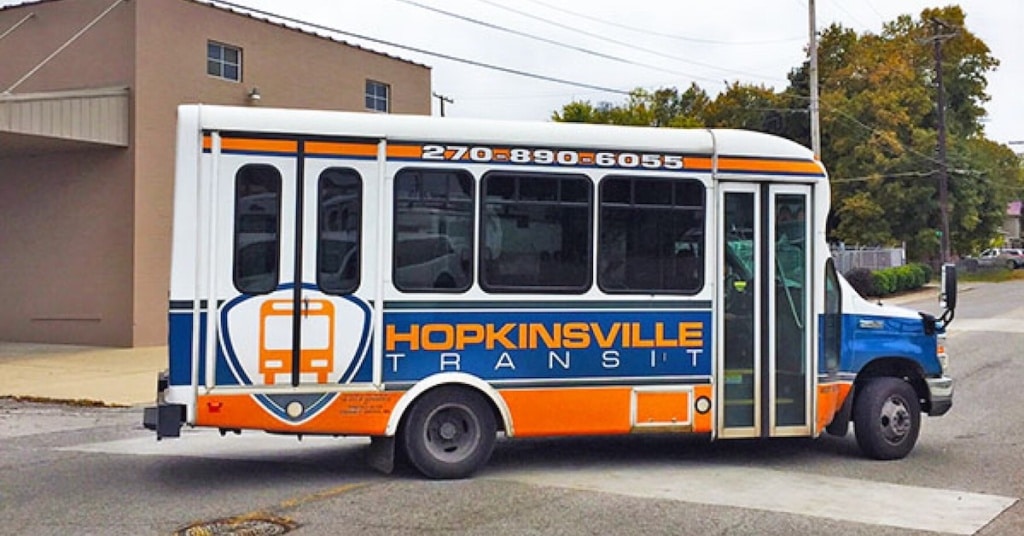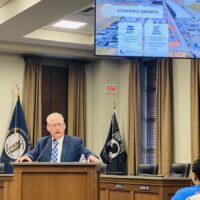The Kentucky Public Transit Authority (KPTA) is contending with ongoing supply chain issues as it works to provide local transit services with new buses this year.
Among them is Pennyrile Allied Community Services (PACS), bussing senior citizens in nine counties and offering public transit in Hopkinsville and Madisonville. PACS Transportation Director Vickie Pennington ordered six buses in December 2020 and has yet to receive any.

“With PACS, they were falling behind already because they weren’t renewing and ordering enough vehicles to keep up with the transition, and then COVID-19 hit,” Pennington said. “I actually have enough grant money to order 14 more vehicles, but I haven’t been real excited about it because I can’t really get the ones I’ve had on order.”
Pennington said three out of the five buses PACS operates in Hopkinsville have nearly reached 300,000 miles, even though buses are typically decommissioned after 100,000 miles or five years. With no replacements in sight, maintenance has become paramount.
“When I ordered those replacements, they had about 125,000 miles on them,” Pennington said. “When I had a transmission fall out of one of the buses, I had to put a new transmission in it because I didn’t have another bus to use, to pull from anywhere.”
Compounding matters was the New Year’s Day tornado, which damaged nine buses in Hopkinsville. PACS was unable to run city transit in the town for three days before borrowing buses from another agency for a couple weeks while repairs were made.
Based on her talks with transportation officials and sales representatives, Pennington said there are about 100 orders throughout the state that need to be fulfilled, but Ford is prioritizing the production of its high-selling F-150 trucks over buses amid a persistent microchip shortage.
Labor shortages, production shutdowns, transportation delay and lacking materials have been cited as other hurdles in the rollout of new cars, trucks and buses nationwide. Such issues have even idled buses in King County, Seattle.
“Some of them have put out the projection that we may not get any new vehicles until the beginning of 2024,” Pennington said. “If that’s the case, there’s going to be a lot less transportation that we’re going to be able to perform because I won’t have the vehicles to do it.”
The three buses the Murray-Calloway Transit Authority (MCTA) ordered last year have also not been delivered due to microchip shortages. Having received 12 new buses in 2017, MCTA Executive Director Rodney Skinner doesn’t anticipate major mishaps with his existing fleet, but he hopes to retire some of the higher-mileage buses regardless.
“It doesn’t take us that long to roll [100,000 miles], as I’m sure you can imagine, because all we’re doing is constantly moving,” Skinner said.
“We do have some that get up in excess of 200,000 from time to time. As long as they’re serviced and everything is kept up with them, we generally don’t have a lot of issues. We’re lucky for that, I think.”
Fewer riders is another concern, as buses that could typically hold eight riders are currently limited to four to adhere to social distancing protocols.
“We usually have an average of 14 to 15 vehicles on the road a day, and that’s route and on-damage service,” Skinner said. “So usually, in some form or fashion, we’re able to get people picked up and taken to where they need to go.”
The KPTA orders buses on behalf of local transit services across the state. Beyond microchips, KPTA President Pam Shepherd said specific parts such as seats and blower motors have been tough to track down, further slowing the production of buses.
“The longer it goes, the worse it gets. We’re not really sure how much trouble we’re going to be in,” Shepherd said. “Granted, during the COVID issues, transportation has been down, so that’s kind of helped in that situation, because you’re not doing as much as you were doing pre-COVID.”
Even for Shepherd’s own transit service, Federated Transportation Services of the Bluegrass, mechanics are opting to replace transmissions in aging buses out of sheer necessity. The prevailing theme for this sector seems to be uncertainty.
“If I could foresee the future, we’d be doing good,” Shepherd said. “We’ve talked to all the bus companies, and they’re at the mercy of the higher-on-ups all the way to the Ford Motor Company.”






